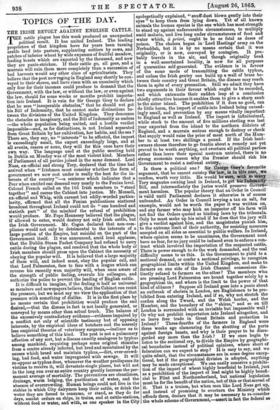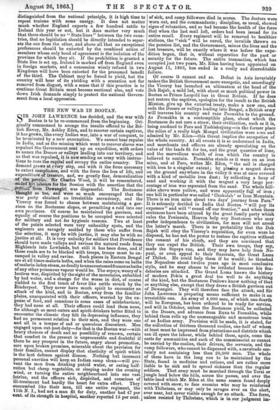TOPICS OF THE DAY.
•
TITF. IRISH REVOLT AGAINST ENGLISH CATTLE.
THE cattle plague has this week produced an unexpected political result. It has united Ireland. The leading proprietors of that kingdom have for years been turning arable land into pasture, supplanting cottiers by cows, and patches of inferior wheat by wide expanses of fruitful meadow, feeding beasts which are exported by the thousand, and now they are panic-stricken. If their cattle go, all goes, and a murrain will ruin them more completely than a succession of bad harvests would any other class of agriculturists. They believe that the pest nowraging in England may shortly be con- veyed to their shores, and have risen with an unanimity which only fear for their incomes could produce to demand that the Government, with the law, or without the law, or even against the law, should for some weeks or months prohibit importa- tion into Ireland. It is vain for Sir George Grey to declare that be sees " insuperable obstacles," that he should not get his Bill of Indemnity, that he cannot make distinctions be- tween the divisions of the United Kingdom. They denounce the obstacles as imaginary, and the Bill of Indemnity as useless —the whole population being united, and a hostile verdict impossible—and, as for distinctions, is not Ireland separated from Great Britain by her cultivation, her habits, and the sea ? There are, they say, no " interests " to be affected, the import is exceedingly small, the export exceedingly large, and at all events, reason or none, they will for this once have their own way. The language used at the public meeting held in Dublin on Monday was of the most violent kind. Members of Parliament of all parties joined in the same demand. Lord Naas, ex-official and strong Tory, declared that the time had arrived when "Irishmen must consider whether the form of government we now rest under is really the best for the in- terests of the country "—a sentence which indicates that a Peer when excited can descend very nearly to the Fenian level. Colonel French called on the 105 Irish members to "stand together" and coerce the Cabinet into justice. Mr. Monsell, ex-official and Whig, with earnest but oddly-worded particu- larity, affirmed that all the Fenian publications scattered broadcast throughout Ireland could not do " one hundred and sixtieth part" of the mischief the refusal of prohibition would produce. Mr. Pope Hennessy believed that the plague, if allowed to enter, would destroy not only Irish cattle, but the Irish Government. Mr. Cogan declared that non-com- pliance would not only be detrimental to the interests of a large portion of the Empire, but suicidal on the part of the Government itself. It was announced, amid loud applause, that the Dublin Steam Packet Company had refused to carry cattle during the plague, and resolved that the whole body of Irish members should press upon the Cabinet the necessity of obeying the popular will. It is believed that a large majority of them will, and indeed must, obey the popular call, and that Lord Palmerston, face to face with a league which can reverse his recently won majority will, when once aware of the strength of public feeling, overrule his colleague, and authorize the police to prevent the landing of English cattle.
It is difficult to imagine, if the feeling is half as universal as members and newspapers believe, that the Cabinet can resist the pressure, but we must say we view the application of that pressure with something of dislike. It is in the first place by no means certain that prohibition would produce the end desired,—that the disease in fact is not locally generated, or conveyed by means other than actual touch. The balance of the excessively contradictory evidence—evidence impaired by a conflict not only of scientific testimony but of opposing interests, by the empirical ideas of butchers and the scarcely less empirical theories of veterinary surgeons,—inclines us to believe something of this kind. The pest is not a pulmonary affection of any sort, but a disease exactly analogous to typhus among mankind, requiring perhaps some original stimulus from a centre already infected, but bred and maintained by the causes which breed and maintain typhus,—dirt, over-crowd- ing, bad food, and water impregnated with sewage. It will re-appear as typhus does, whenever the weather predisposes its victims to receive it, will devastate single places, but will not in the long run over an entire country greatly increase the per- manent average of mortality. The preventives are cleanliness, drainage, warm lodging, the purification of water, and the absence of overcrowding. Human beings could not live in the stables in which City dairymen keep their cattle, or drink the water they are forced to consume, or stand, as they do for days, amidst ordure on ships, in trains, and at cattle-stations, without food or water, and with, as one speaker in the City apologetically explained, "snuff-dust blown gently into their eyes " to keep them from lying down. Yet of all known animals the human species is the one which has most strength to stand up against unfavourable circumstances, to multiply amid malaria, and live long under circumstances of food and water which, a priori, ought to be as fatal as doses of poison. The cholera began in • Lord Hastings' army on the Nerbuddah, but it is by no means certain that it was originally, or is now, conveyed by contagion. It pro- bably travels in the air, and though originally bred, in a well ascertained locality, is now for all purposes of quarantine self-generated. The evidence is in favour of the same mode of transmitting the cattle typhus, and unless the Irish gentry can build up a wall of brass be- tween their country and Great Britain, the disease may reach them in spite of every precaution. Still we admit they have two arguments in their favour which ought to be recorded, and which extenuate their sudden leap at a conclusion chiefly attractive because it enables them to give a sharp snub to the sister island. The prohibition if it does no good, can do little harm, the import of cattle into Ireland being exceed- ingly small, and prevention by any means vitally important. to England as well as Ireland. The import is infinitesimal, while stock to the amount of five millions sterling was last year exported from the island to the northern diStricts of England, and a murrain serious enough to destroy or check that supply would raise the price of meat north of the Hum- ber to at least two shillings a pound. If the Irish land- owners choose therefore to go frantic about a remedy not yet proved to be worth anything, and overturn all political parties rather than leave their special nostrum untried, there is no strong economic reason why the Premier should risk his Government to resist a national outcry..
Is there a political one ? Sir George Grey's favourite argument, that he cannot outstep thirlaw, is in this eas e we confess, worth very little. He would be sure, with-lioires* Tory magnates owning land in Ireland, to get hie`-Iiiitetbi Bill, and intermediately the juries would preserve Cto'vb ment harmless. The popular theory that an Order in Council is valid until Parliament declares it otherwise is of course unfounded. An Order in Council levying a tax on salt, for example, would not be worth the paper it was written on, and any farmer who may kick an inspector off his farm will not find the Orders quoted as binding laws by the tribunals. Only he must make up his mind if he does that the jury will give a verdict against him, and the magistrates punish him, to the extreme limit of their authority, for resisting measures accepted on all sides as essential to public welfare. In Ireland, where opinion seems to be unanimous, the Government need have no fear, for no jury could be induced even to enforce a con- tract which involved the importation of the suspected cattle.. There is power enough to do the work demanded, and the real difficulty seems to us this. Is the Government to yield to a sectional demand, or confer a sectional privilege, to recognize geographical limits within the United Kingdom, and make to farmers on one side of the Irish Channel conoessions tinctly refused to farmers on the other ? The members who• are pressing Lord Palmerston are bound together solely by a geographical tie, and where is the limit to the power of that kind of alliance ? Suppose all Ireland goes into a panic about an outbreak of cholera in London, are Englishmen to be pro- hibited from entering Ireland, and if so, why not stretch the cordon along the Tweed, and the Welsh border, and the Humber, and the boundary of the " shires, " and so on till London is surrounded with an invisible but impassable wall ? Or why not prohibit importation into Ireland altogether, and so leave free trade in Great Britain and protection in Ireland ? Three-fourths of the farmers in England were three weeks ago clamouring for the shutting of the ports against foreign beasts, and why is their prayer to be disre- garded any more than the Irish ? If we once begin to listen to the sectional cry, to divide the Empire by geographi- cal boundaries instead of political opinions, where short of federation can we expect to stop ? It is easy to say, and we quite admit, that the circumstances are in some degree excep- tional, but if the geographical division is adopted, anything may be made exceptional. We can easily conceive a prohibi- tion of the import of wheat highly beneficial to Ireland, just as a prohibition of the import of lead might be highly benefi- cial to Flint and Northumberland, but national legislation must be for the benefit of the nation, not of this or that morsel of it. That is a truism, but when men like Lord Naas get up, and instead of promising to overturn the Ministry which offends them, declare that it may be necessary to re-consider the whole scheme of Government,—assert in fact the federal as distinguished from the national principle, it is high time to repeat truisms with some energy. It does not matter much whether England exports a few hundred cattle to Ireland this year or not, but it does matter very much that there should be no " State lines " between the two coun- tries, that no legislation should be directly intended to separ- ate the one from the other, and above all that no exceptional preferences should be extorted by the combined action of members whose only bond of agreement is the isolation of the province for which they sit. If the prohibition is granted a State line is set up, Ireland is marked off from England even in foreign markets, and a concession wisely refused in two Kingdoms will have been extorted for the presumed benefit of the third. The Cabinet may be forced to yield, but the country will hear of its yielding with a sensation not far removed from disgust, with a sense that if this practice is to continue Great Britain. must become sectional also, and vote down Irish demands simply to protect the national Govern- ment from a local oppression.































 Previous page
Previous page